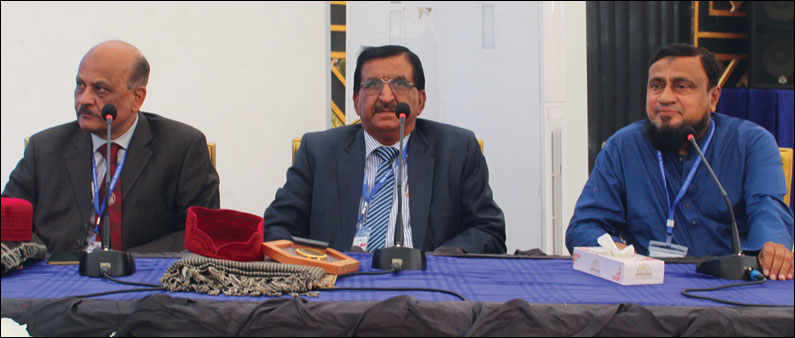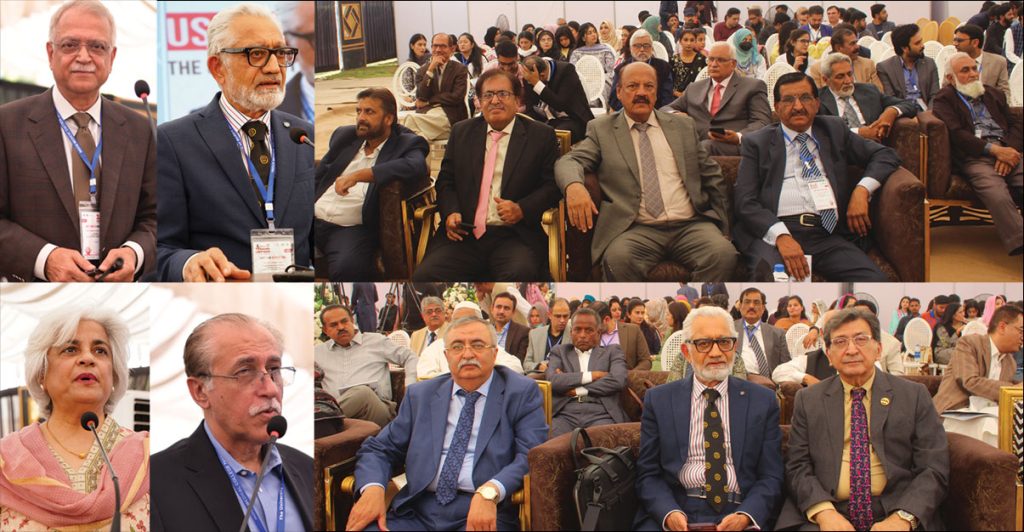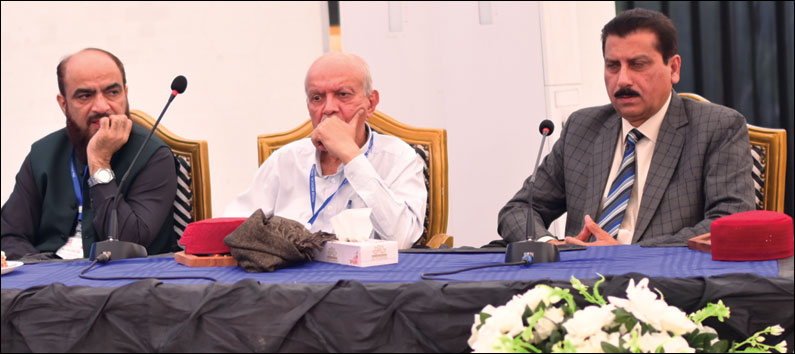By Mubarak Ali
TANDO MUHAMMAD KHAN: Indus Medical College & University of Modern Sciences organized its 4th Annual conference on December 5, 2024 at university campus which was very largely attended by the members of the medical profession from different cities besides faculty and students of the university. Inaugural session of the conference was held at Hyderabad on 4th December besides pre conference workshops. Free paper session was also part of the conference held on 5th December. “Right Care at the Right Time” was the Theme of the conference.

Prof. Akram Ajmal, Prof. Altaf Talpur and Prof. Syed Asad Shah chairing Surgery session during the 4th annual conference of Indus Medical College & University of Modern Sciences held on December 5th, 2024 at Tando Muhammad Khan.
Dr. Muhammad Iqbal Memon Chancellor & CEO and Professor Feroz Memon Vice-Chancellor Indus Medical College & University of Modern Sciences managed to invite distinguished speakers which included Professor Javed Akram President Pakistan Society of Internal Medicine from Lahore, Prof. Iqbal Udaipurwala, Professor of ENT, Bahria University, Karachi, besides five speakers from Aga Khan University Karachi which included Prof. Saeed Hamid Consultant Gastroenterologist, Prof. Inam Pal , Professor of Surgery, Prof. Ali Faisal Saleem, Consultant Infectious Diseases, Dr. Syeda Saira Bukhari Assistant Professor of Cardiology and Dr. Sadiha Pal Consultant Gynecologist. Speakers in the scientific sessions addressed critical topics in healthcare, discussed innovative approaches to tackle current and future challenges in the field of medicine.
Prof. Iqbal Udaipurwala was the first speaker who discussed current concepts in the management of differentiated thyroid tumors. The incidence of thyroid cancer he stated is increasing Worldwide. In the year 2020 newly diagnosed cases of thyroid cancers were found to be five hundred eighty five thousand. It is approximately 3% of all cancer cases and about 10 to 15% of all patients who presented with a solitary nodule have some form of thyroid cancer. Thyroid nodules can be detected in 5 to 7% of adult population upon physical examination while with the modern ultrasound techniques the frequency of thyroid nodules has been reported as high as 67% cases.

Prof. Javed Akram, Prof. Saeed Hamid, Prof. Inam Pal and Prof. Sadiah Ahsan pal speaking at the 4th annual conference of Indus Medical College & University of Modern Sciences held on December 5th, 2024 at College Campus in Tando Muhammad Khan.
Overall prognosis of thyroid cancer is very good only less than 10% of patients will die of the disease within ten years of presentation. Five years survival rate is almost 99.9% if the disease is limited to thyroid gland on presentation. He discussed in detail various carcinomas and stated that papillary carcinoma is the most common carcinoma which is slow growing tumor, arises from thyrocytes/ folfocular cells. Ultrasonography is the most important and must be performed first. Thyroid nodules are not always same as FNAC or ultrasound predicts, Clinical experience and judgment is very important for management of these cancers. Post-op histopathology is gold standard for definite diagnosis and long term regular follow-up is very important, he concluded.
Dr. Syeda Saira Bukhari talking about emerging therapies for heart failure stated that it is a progressive disease and 40 to 50% adult population suffers from heart failure. Lifetime risk of developing heart failure ranged between 26% to 40% among adults who are alive at age of 45 years. Approximately 50% of patients diagnosed with heart failure will die within five years. The five alive or fantastic /fab four lifesaving therapies include ACEI/ARB, Neprilysin inhibitor, Beta Blockers. MRA and SGLT2 inhibitors the pillars of HFrEF therapy 2022.
She discussed in detail the latest therapies available for the management of Heart Failure besides emerging role of Semaglutide. ARNIs are effective in reducing the risk of death and hospitalization for patients with heart failure. Patients experiencing asymptomatic hypotension should not discontinue ARNI but they should rather be thoroughly monitored and ARNI titration scheme should be individually tailored with a stepwise approach.
Prof. Saeed Hamid presented WHO 2024 guidelines for prevention, diagnosis and treatment of people with chronic Hepatitis B infection. Two hundred ninety two million people, he said, are chronically infected with HBV globally and one million people die every year as a consequence despite the availability of vaccines and antivirals. HBV is a DNA virus like EBV, CMV, HSV, and VSZ and is currently an incurable infection.

Dr. Iqbal Memon and Prof. Feroz Memon Chancellor and Vice Chancellor of University of Modern Sciences respectively presenting Mementoes to distinguished guests from (L to R) Brig. Khurram Sarfaraz, Dr. Lala Jaffar, Dr.Sadik, Mr. M.Yousuf Shaikh, Mr. Yasir Bhatti, Mr. Zainul Abideen Memon and Dr. Samreen Qureshi at the Gala Dinner of Indus Medical College, University of Modern Sciences held at Hyderabad on December 4th 2024.
All patients have remnants of HBV DNA in their liver in the form of cccDNA and HBV has no natural immunity. Anti-HBV is not protective against reactivation, even with high titers of anti HBs, risk of reactivation remains substantial. What we are trying to achieve by treating Ch HBV infection is to minimize liver damage, normal ALT levels and lower HBV DNA levels. Why the need for updated WHO HBV guidelines was felt because still there is major gap in testing and treatment updates, complex guidelines, regional differences in demographics and epidemiology, emerging evidence and access challenges etc. Key topics of new Hepatitis B Guidelines includes noninvasive fibrosis assessment, who to treat, first line treatment, PMTCT, simplifying diagnosis and service delivery.
Prof. Ali Faisal Saleem talked about rational use of drugs in children. While treating children we should know the drug is safe to use, approved for use in children, use appropriate dose, child age and weight besides have information about side effects. While prescribing antibiotics we must ask ourselves that are these antibiotics necessary, what antibiotics we can offer. Antibiotics do not kill viruses, they kill bacteria, when possible get a culture to determine if antibiotics will be effective, conserve the antibiotics we have by only prescribing when appropriate , for the shortest duration possible and consult local antibiogram for selection of appropriate antibiotics. Don’t let patient pressure you into prescribing unnecessary antibiotics, do select the appropriate antibiotic which could mean changing the medication based on the antibiogram. Educate your patient, their families and community for better management, he added.

Prof. Sadik Memon, Prof. Rafi Ahmed Ghouri and Prof. Akram Bajwa chairing a session on Gastroenterology during the 4th annual conference of Indus Medical College & University of Modern Sciences.
Prof. Javed Akram’s topic of presentation was Good bye to Insulin. Advancement in diabetes care he stated is rapidly transforming the management of type-2 Diabetes suggesting a future where insulin therapy may become obsolete. Non-insulin therapies are becoming more popular now days. Insulin has been a cornerstone treatment for the management of type- 2 Diabetes particularly in advance stages. Barriers to successful treatment intensification with insulin therapy are very individual. Despite advances in insulin treatment hypoglycemia remain a 24 hour challenge and concern that impacts all aspects of life besides fear of weight gain is a barrier to insulin use. Weight gain loss can have great benefits in patients with Type- 2 diabetes. Emerging therapies like GLP-1 receptor agonists, SGLT2 inhibitors and personalized medicine approaches are proving to be more effective in addressing the root causes of the disease. These not only improve glycemic control but also address associated metabolic dysfunction, reduce cardiovascular risk and help in weight loss.
Prof Javed Akram said that advancement in lifestyle medicine like CGM technology empowers patients to self-manage their condition more effectively. Gene editing technologies like CRISPR and regenerative medicine such as beta-cell transplantation hold promise for potentially curing T2D rather than managing it. As these therapies evolve and become widely accessible, the reliance on Insulin for T2D may decline transforming the paradigm of diabetes care. Times are changing and newer treatments are delaying insulin initiation in type 2 diabetes. GLP-1 RAs hold the dominant share globally in comparison to all other anti-diabetic medication including insulin.

Prof. Iqbal Udaipurwala, Dr. Syeda Saira Bukhari and Prof. Ali Faisal Saleem speaking at 4th annual conference of Indus Medical College & University of Modern Sciences held in Tando Muhammad Khan on December 5th, 2024.
Exploring future diabetes Prof. Javed Akram said that treatment with Stem cell Therapy with unlimited proliferation and differentiation capacity, pluripotent stem cells have the potential to be a valuable resource in regenerative medicine and the treatment of serious diseases. Medicine innovation, diabetes understanding, devices intervention and right approach to care are the major component of vision towards a better future. Cross partner collaboration headed by Government, NGO’s, corporate industry, faith group and media can play an important role in the management of diseases, Prof. Javed Akram concluded.
Prof. Inam Pal talking about Esophageal Cancer said that it is the most dangerous cancer, Pan and Ghutka are the major causes besides smoking. Dr. Pal presented the results of single surgeon audit focusing on Anastomotic complications from May 2006 to October 2024 on two hundred nine cases. Single layer continuous suture, intra-thoracic Esophago-Gastric Anastomosis is safe, can have very low anastomotic complication rate. It should be one of the benchmark for quality of surgical care and Neoadjuvant Chemo/ Radiotherapy impacts survival.
Dr. Sadiha Pal talked about Preterm Birth Management and highlighted the salient features of Preterm Birth & Antenatal Corticosteroids Guidelines for Pakistan. Estimated 15 million babies, she said, are born preterm every year globally and PTB is the leading cause of deaths under the age of five years. WHO antenatal care guidelines provided solution. Healthy pregnancy with quality care before, between and during pregnancies will ensure all women have positive pregnancy experience. Healthy diet, nutrition, avoid tobacco and substance use, fetal measurement, ultrasound to help determine gestational age and detect multiple pregnancies. A minimum of 8 contacts with health professionals throughout pregnancy to identify and manage other risk factors can be very useful.
Access to contraceptive and empowerment could also help reduce preterm births. More than 3/4 of preterm babies can be saved with cost effective care. Preterm birth Dr. Sadiha Pal stated is one of the third leading causes for neonatal mortality and accounts for more than one third of all deaths in newborns. ACS is safe and effective and its use requires a health system that offers four basic services like accurate gestational age assessment, improved identification of imminent labor, adequate postnatal care and Dx and TX of maternal sepsis.
In his closing remarks, Dr. Muhammad Iqbal Memon emphasized the importance of continuous learning and collaboration in the medical field. He stated, the challenges in health care are ever-evolving, and only through unity, innovation, and dedication we can overcome them. This conference is not just an event but a beacon of progress and hope for the future of medicine The 4th Annual Conference reaffirmed the institution’s dedication to advancing medical science and improving healthcare outcomes. We have facilities like Neonatal ICU, Pediatrics ICU, we have Ventilator even transport ventilator is also available. All types of surgeries are being performed at Indus hospital and we are also planning to start dialysis facility. Dr. Muhammad Iqbal Memon lauded the efforts of Prof. Feroz Memon and his team for organizing this event successfully.
Earlier Prof. Feroz Memon in his welcome address thanked the participants for gracing the occasion with their presence and informed that besides Indus Medical College, we have Nursing College, Physiotherapy College, Para Medical College and Pharmacy College. We have got management sciences, information technology, BS in Radiology technique. We are grateful to CPSP who have recognized our twelve programs and all major departments are recognized for FCPS and we have thirty five postgraduates and seventy House Officers.



